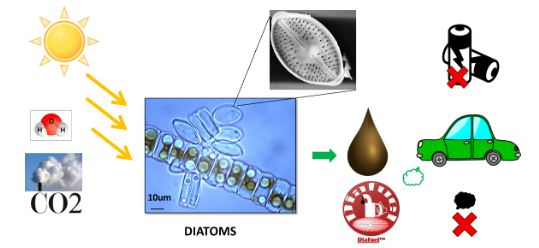


The current scenario in Middle East could be bad state of affairs for India’s
economy. India
is world’s 3rd largest consumer of crude oil which meets more than 80% of its oil
requirements and 40% of its natural gas via imports. If India had its own oil
reservoirs it
would be easier to sustain its economy. Even though India started to switch to
electric
vehicles by 2030 but it has been a slow start and crude oil requirements can’t be
replaced
at par by electricity in all. If India starts making its own oil via biofuel at
large scale at low
costs it could revolutionize the energy requirements not only for itself but also
for other
countries. Therefore India needs to focus more on its energy production via
alternate
measures and biofuel from algae. Among algae diatom are definitely a rescue if cost
of
production of biofuel from diatoms also known as diafuel is reduced.
If oil could have been milked from diatoms without killing or crushing or extracting
them;
just like milk is harvested from cows, the cost of production of oil could be
brought down.
To meet this requirement we fabricated a miniature diatom solar panel on a 2”
silicon wafer
as well as designed a metabolically engineered diatom in dye sensitized solar cell
which
produced electricity as well as diafuel. Among these it was found that our miniature
diatom
solar panel harvested oil with almost zero energy. The device worked effortlessly
under the
resonance energy gained by micro pillars in the miniature solar panel. Inspired with
this
work at IIT Bombay we made a bench top diatom solar panel and processed for its
patent.
The idea of a diatom solar panel for diafuel production is keeping diatoms in their
nutrient
medium exposing them to sunlight with no external source of artificial energy so as
to run
the system for resonance energy. This will not only encourage Indian scientist to
improve
alternate ways of energy source but will also make India independent of crude oil
dependence onto foreign countries. The major advantages of diafuel (diatom biofuel)
from
diatoms are direct production of ‘petrol” lipid in diatom solar panels. Diatom solar
panels
unlike the normal solar panels are individual diatom cell factories which harvest
oil. This
also explains why there would not be any need to replace automobile engines with
electricity driven lithium ion batteries. Since petrol products are interchangeable,
no
brownouts due to electric vehicles causing electric grid shortages would occur. Also
the
production of the lipid energy is off the grid and petrol vehicles would remain the
majority
and no need for short-lived, expensive, heavy, polluting lead batteries to store
solar energy
may be required.

